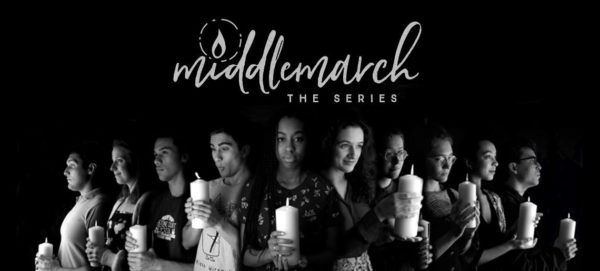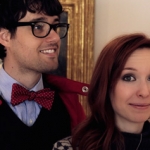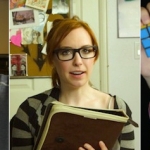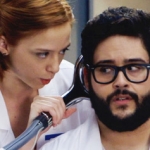George Eliot’s classic novel Middlemarch is now making waves on YouTube as a revamped web series. Rebecca Shoptaw writes a LGBTQ+ version of the old romance novel as a live-action drama. We have the heroine Dot Brooke seeking social justice and Fred Vincy trying to find his way in the world. The modern retelling, available to watch here, is inclusive of gender and race in a positive way. Rebecca agreed to an interview to tell us more about this awesome series.
Hi there! Can you tell Fandomania readers about yourself and the web series?
Hey! My name is Rebecca Shoptaw and I’m a soon-to-be senior at Yale majoring in Film Studies, who spends most of her time making cute happy short films about LGBTQ+ characters. I’m also the writer/director/showrunner for Middlemarch: The Series, which is a gender-bent modernized vlog-style adaptation of George Eliot’s Victorian novel Middlemarch. The series follows a small group of mostly-LGBT college students in the fictional town of Middlemarch, Connecticut, as they struggle to figure out who they are and what they want.
What made you decide on remaking Middlemarch? What was it about the story that intrigued you?
One reason why I chose to adapt Middlemarch was my love for the original novel. When I read the novel for the first time in class last spring, I was struck by the beautifully flawed nature of the characters and the almost defiantly ordinary plot. Even long after the class was over, I felt like I wasn’t quite done with the world of Middlemarch.
But I still wouldn’t have adapted Middlemarch if I hadn’t realized that I could gender-bend several characters to make most of the main characters and relationships LGBT. Because of the lack of LGBTQ+ representation in mainstream media and the impact positive LGBTQ+ representation can have on LGBTQ+ people (including myself), I have made LGBTQ+ representation the center of everything that I do. I think Middlemarch, more than any other Victorian novel I read that semester, lends itself incredibly well to this kind of gender-bending. This is mostly because the novel’s healthier relationships are almost entirely free of the gendered power dynamics that too often shape the relationships in classic novels. Because of this, I was able to flip around several genders and sexualities without drastically changing the feel of the relationships.
So while Eliot’s three-dimensional characters and insistence on telling ordinary stories both made me love Middlemarch, it is, more than anything, the novel’s potential for LGBTQ+ representation that made me adapt it.
What was the biggest challenge of getting Middlemarch off the ground?
I think the biggest challenge for getting the series off the ground was actually casting. Even once I’d overcome the not insignificant initial hurdles of the casting process — trying to convince college theater actors to audition for a web series directed by someone they’d never met — I ended up dealing with a lengthy recasting process that made the filming last far longer than I had intended it to. Over the course of the filming, I ended up having to recast four out of the ten roles, and there were definitely a few moments when, in the midst of the chaos of recasting, I considered giving up. But I didn’t, and I’m so glad I didn’t because it really is our phenomenal cast that makes the series what it is.
Is there a message you hope reaches viewers of Middlemarch?
When I set out to adapt Middlemarch, I wanted to give viewers the same feeling I got when I read the novel. To me, Middlemarch is something of a celebration of imperfect people living ordinary lives. Each time I finish reading those last beautiful lines of the novel, I am overwhelmed with the feeling that a quiet, messy, everyday kind of happiness is something worth striving for, and I hope that when the series finally finishes airing, some of the people watching will be left feeling the same way.
Were you inspired by any other web series out there?
I watched The Lizzie Bennet Diaries soon after it finished airing, and more recently Carmilla and All For One when they aired, and while none of these series were necessarily specific inspirations for Middlemarch, they helped me gradually realize that a series like this — a vlog-series — was something I could create. I remember that as early as freshman year of college, I was musing about maybe making an adaptation series, but I really wanted it to be centered on LGBTQ+ characters, so I could never figure out what to adapt. Once I’d found Middlemarch, when I was writing the series over last summer, I set out to watch every literary web series I could find. It’s interesting, though, because I still wouldn’t say that any of these series necessarily inspired Middlemarch: The Series. Rather, they, like the earlier series, gave me a sense of what was possible within the realm of the literary web series: the conventions of the genre, what worked and what didn’t, what had been tried and what hadn’t. Some of my favorites among the series that I watched that summer to figure out the genre would have to be Nothing Much To Do/Lovely Little Losers, Words From Wilde, and Call Me Katie, and more recently I have been obsessed with Away From It All.
Are there other books you would like to adapt in the future?
I know a lot of web series creators go on to make sequel series and/or adaptations of other novels and I have so much respect for the people who do that, but Middlemarch is it for me. Adaptation will likely continue to be a central feature of my work, and I may eventually make some kind of (much shorter) web series again, but, because of how much work the series took and how much I love the way it turned out, I don’t want to follow Middlemarch with another series like it. I put everything I had into this web series and once it’s over, I’m going to let myself step out of the literary web series world and figure out what entirely new and different thing I want to make next.
Any words for viewers of Middlemarch and Fandomania readers?
To anyone who has been watching the series: thank you. For a writer, I’m remarkably bad at expressing my gratitude in words, but it really does mean the world to me to see these characters that I love so much finding their way into other people’s hearts. Every comment, every gifset, every paragraph written in the tags on Tumblr — each of these things makes me feel that this story, small and unconventional and ordinary as it is, is a story worth telling. And there’s nothing better than that.







